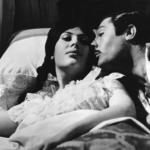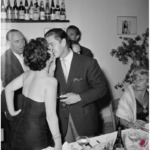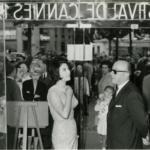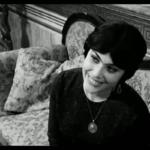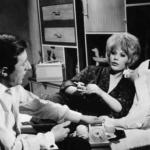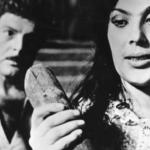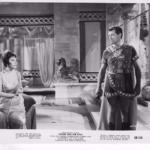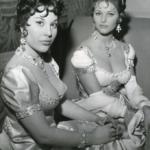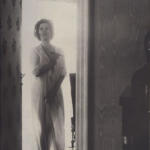 Daniela Rocca was born about eighty years ago (Acireale, September 12th 1937 – Milo, May 28th 1995), an extremely talented actress but undervalued.
Daniela Rocca was born about eighty years ago (Acireale, September 12th 1937 – Milo, May 28th 1995), an extremely talented actress but undervalued.
Elected in 1953 as Miss Catania when she was only fifteen, Daniela participates secretly but once she arrives earlier she leaves her parents unhappy, who had other plans for her. They wanted her daughter to study, to enroll in college. The girl manages to leave home and goes to Rome.
 In Rome, starting to work as a model and then slowly entering the world of cinema, debuting in 1955 in Vittorio Duse’s film Our Champion. The rest can be read in the various filmographies dedicated to the actress. It remains important to note that, after a brilliant interpretation like the one in Divorce in the Italian style, it remained in shadow, participating in subsequent films that certainly did not highlight its acting qualities. Bellocchio called her back in 1979 to take part in her work entitled The cinema machine, in which she interpreted herself: a role of absolute sadness, almost seemed to show everyone the freak-like phenomenon in which she had transformed. Unfortunately, the psychological problems faced – which some attribute to the end of the relationship with Germs and others to work disappointments – marked it indelibly, so much so that it was admitted several times to nursing homes specializing in mental illnesses.
In Rome, starting to work as a model and then slowly entering the world of cinema, debuting in 1955 in Vittorio Duse’s film Our Champion. The rest can be read in the various filmographies dedicated to the actress. It remains important to note that, after a brilliant interpretation like the one in Divorce in the Italian style, it remained in shadow, participating in subsequent films that certainly did not highlight its acting qualities. Bellocchio called her back in 1979 to take part in her work entitled The cinema machine, in which she interpreted herself: a role of absolute sadness, almost seemed to show everyone the freak-like phenomenon in which she had transformed. Unfortunately, the psychological problems faced – which some attribute to the end of the relationship with Germs and others to work disappointments – marked it indelibly, so much so that it was admitted several times to nursing homes specializing in mental illnesses.
 Daniela Rocca, although she is often ignored in film books, was in my opinion very important, because in the early fifties, when she was still very young and in a climate that was anything but open to the idea of an independent woman, she acted in a modern way: his behaviors were certainly aimed at cracking the image of the woman submissive to the family, who leads her existence in a sad, disconsolate way because she doesn’t do what she would like to do, under the banner of “I can’t”, ” I would like but they won’t let me! ”
Daniela Rocca, although she is often ignored in film books, was in my opinion very important, because in the early fifties, when she was still very young and in a climate that was anything but open to the idea of an independent woman, she acted in a modern way: his behaviors were certainly aimed at cracking the image of the woman submissive to the family, who leads her existence in a sad, disconsolate way because she doesn’t do what she would like to do, under the banner of “I can’t”, ” I would like but they won’t let me! ”
In the shot on the left a beautiful portrait of the actress in the mid-60s.
In the shot on the right the actress together with the director Pietro Germi – with whom she had a tormented relationship – in the role of Baroness Rosalia Cefalù, wife of the protagonist Don Fefè – Mastroianni, on the set of Italian Divorce (1961).
Filmography
La Luciana, directed by Domenico Gambino (1954)
Il nostro campione, directed by Vittorio Duse (1955)
Il padrone sono me, directed by Franco Brusati (1955)
Elena di Troia, directed by Robert Wise (1956)
Addio sogni di gloria, directed by Giuseppe Vari (1957)
Il cielo brucia, directed by Giuseppe Masini (1957)
Mercanti di donne (Marchands de filles), directed by Maurice Cloche (1957)
Giuditta e Oloferne, directed by Fernando Cerchio (1959)
Non perdiamo la testa, directed by Mario Mattoli (1959)
Caltiki, il mostro immortale, directed by Riccardo Freda, Mario Bava (1959)
Le legioni di Cleopatra, directed by Vittorio Cottafavi (1959)
La battaglia di Maratona, directed by Jacques Tourneur, Mario Bava (1959)
La battaglia di Austerlitz (Austerlitz), directed by Abel Gance (1960)
La regina delle Amazzoni, directed by Vittorio Sala (1960)
Ester e il re (Esther and the King), directed by Raoul Walsh, Mario Bava (1960)
La vendetta dei barbari, directed by Giuseppe Vari (1960)
I masnadieri, directed by Mario Bonnard (1961)
Divorzio all’italiana, directed by Pietro Germi (1961)
Il peso del corpo, directed by Daniela Rocca
Peccati d’estate, directed by Giorgio Bianchi (1962)
La città prigioniera, directed by Joseph Anthony (1962)
I dongiovanni della Costa Azzurra, directed by Vittorio Sala (1962)
L’attico, directed by Gianni Puccini (1963)
Sinfonia per un massacro (Synphonie pour un massacre), directed by Jacques Deray (1963)
La noia, directed by Damiano Damiani (1963)
E venne il giorno della vendetta (Behold a Pale Horse), directed by Fred Zinnemann (1964)
Colpo grosso ma non troppo (Le Corniaud), directed by Gérard Oury (1965)
Assicurasi vergine, directed by Giorgio Bianchi (1967)
Un giorno, una vita, directed by Albino Principe (1970)
La macchina cinema, directed by Marco Bellocchio (1977) (documentario)
Daniela Rocca has written six almost impossible-to-find novels:
Agente segreto con licenza di vivere
Avvocato offresi
Il condannato a morte
Psicanalisi, sogni, fantasie nascosti nella mente (prefazione di Marco Bellocchio)
Chiamatemi per le lune, Edizioni Don Chisciotte, Roma, 1978.
Photo source
https://www.royalbooks.com/pages/books/138974/daniela-rocca/daniela-rocca-candid-at-the-1962-cannes-film-festival-collection-of-19-original-photographs-of-the
https://www.wikifeet.com/Daniela_Rocca
Adapted from : Indagine Di Una Cittadina Al Di Sopra Di Ogni Sospe
The Rome Central – Italy in the world editorial staff consists of freelance editors, journalists, photographers, filmmakers, doctors, writers, video-makers, supporters, poets, writers, actors, singers and many friends.
RomeCentral is a Magazine completely no-profit , whoever writes in this magazine does his job without any commercial pressure.
NB: No people in Rome Central, from managers to employees etc .., receive any type of compensation.
The love for the free journalism repays all our efforts.

